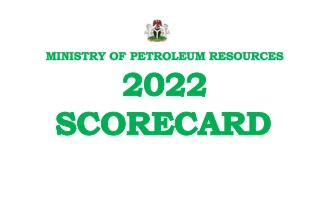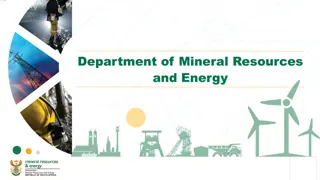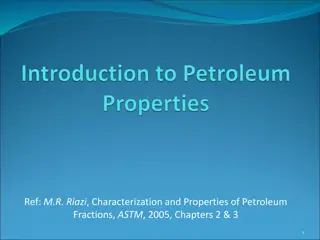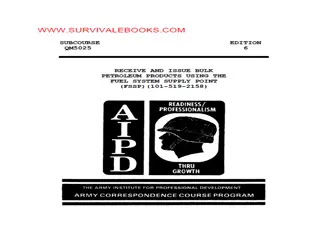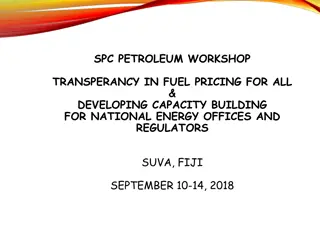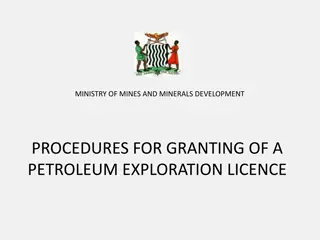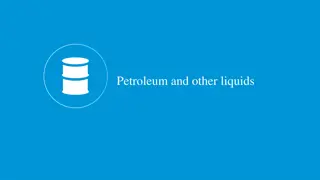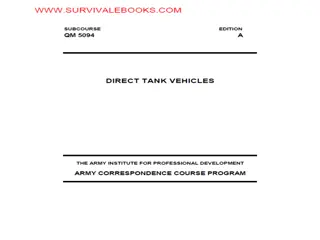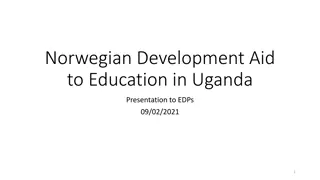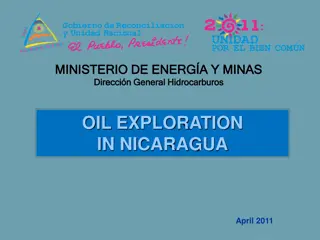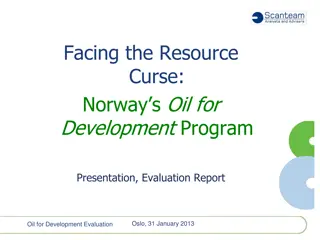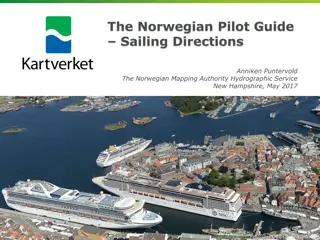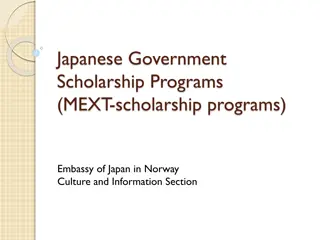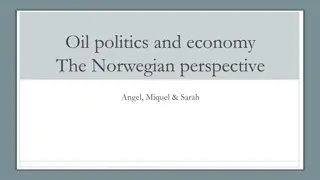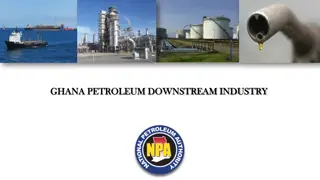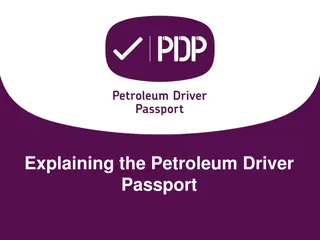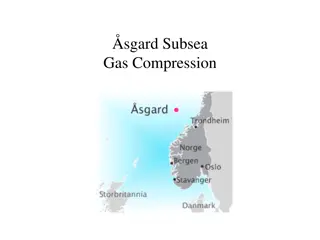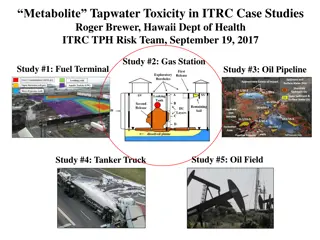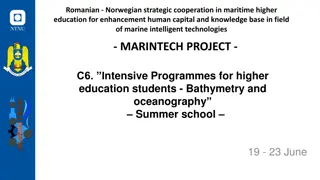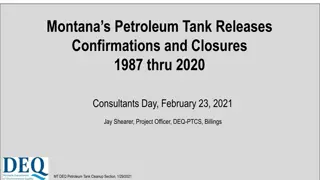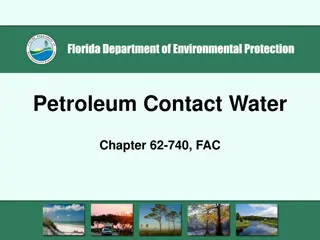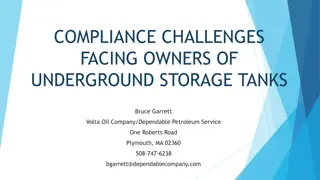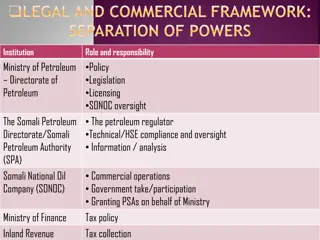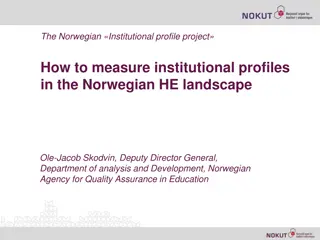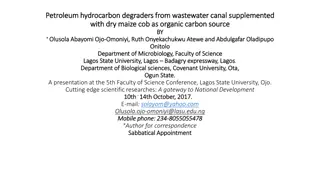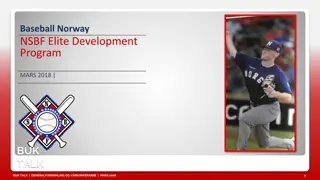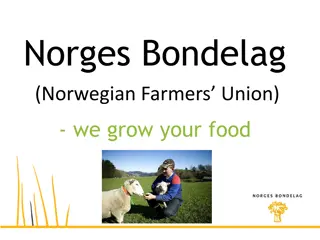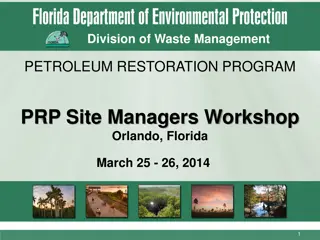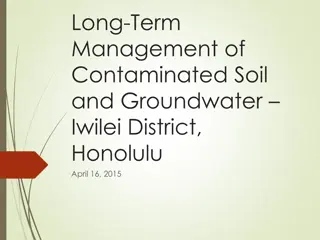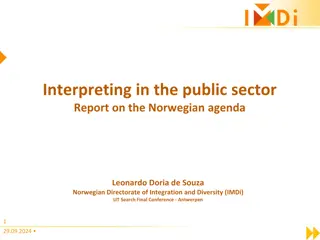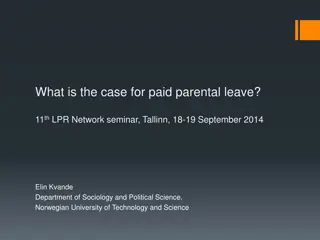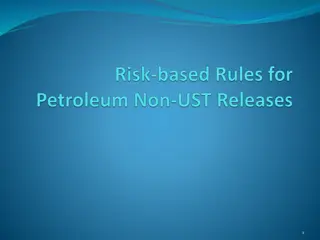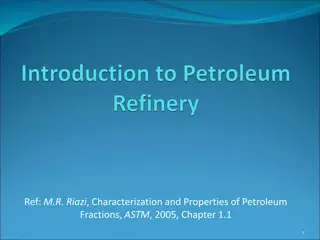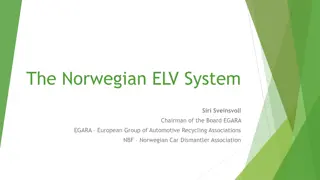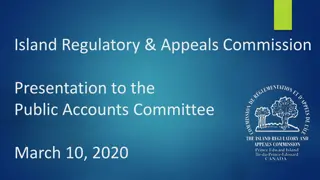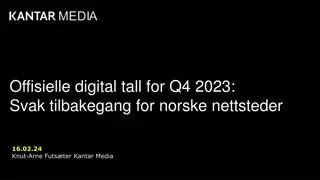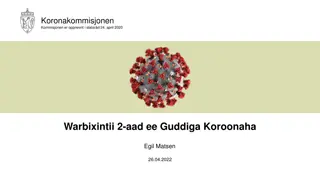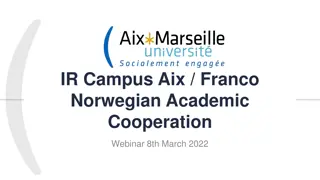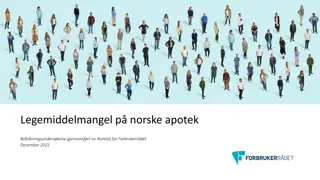Overview of the Norwegian Railway Sector
The Norwegian railway sector underwent significant reforms in 2015 under the Ministry of Transport and Communications, with strategic governance by the government. The sector is managed by various bodies like the Norwegian Railway Directorate, Norwegian Railway Authority, and Accident Investigation
0 views • 42 slides
Strategic Roadmap for Nigeria's Petroleum Industry: 2019-2023
This document outlines the key strategic priorities set by the Ministry of Petroleum Resources in Nigeria for the period 2019-2023. It covers objectives such as eradicating fuel smuggling, increasing crude oil production, reducing extraction costs, promoting legislative reforms, enhancing refining c
2 views • 32 slides
Petroleum Refining Industry in South Africa: Current Overview
South Africa's economy heavily relies on petroleum, with an installed refining capacity of 520,000 barrels per day and additional Coal-to-Liquid and Gas-to-Liquid refineries. Despite challenges like operational disruptions, the sector plays a crucial role in the country's energy security and economi
0 views • 16 slides
Understanding Petroleum Fraction Distillation Curves
Characterization and properties of petroleum fractions are essential for understanding their behavior, particularly through distillation curves. These curves depict the boiling points of crude oil or petroleum fractions, highlighting components' volatility ranges. Various methods like ASTM D86, True
0 views • 28 slides
Bulk Petroleum Products Handling Procedures at Fuel System Supply Point
Learn how to receive and issue bulk petroleum products using the Fuel System Supply Point (FSSP) in the army. This training covers safety precautions, procedures, and best practices for handling petroleum products efficiently and safely in the field.
0 views • 59 slides
Fuel Pricing Transparency and Capacity Building Workshop in Suva, Fiji
Exploration, drilling, refining, and transportation costs in the petroleum industry were discussed at the SPC Petroleum Workshop in Suva, Fiji. The workshop also covered onshore costs, duties, operating costs, and return on capital employed. Participants shared PICTs experiences on fuel facilities,
0 views • 6 slides
Procedures for Granting Petroleum Exploration Licence by Ministry of Mines and Minerals Development
The Ministry of Mines and Minerals Development outlines the procedures for granting a petroleum exploration licence, including the main stages such as constitution of blocks, advertisement, application evaluation, recommendation, licence offer, and licence grant. These stages involve key activities
0 views • 11 slides
Overview of U.S. Petroleum and Natural Gas Production Trends
This detailed content discusses the production and consumption of crude oil, natural gas plant liquids, and petroleum liquids in the United States. It covers historical data, projections, economic growth scenarios, and price cases for the period up to 2050. The information sheds light on production
0 views • 18 slides
Proper Petroleum Marking and Inspection Guidelines for Vehicles and Equipment
As a petroleum supervisor, it is essential to inspect vehicles and equipment to ensure proper markings, preventing commingling of products and ensuring safety. This lesson covers the inspection of petroleum markings on tank vehicles, safety markings for bulk transportation, marking requirements for
0 views • 152 slides
Norwegian Development Aid to Education in Uganda
Presentation highlights Norwegian development aid initiatives in Uganda's education sector, including projects, budgets, partnerships, and support through various programs and organizations like NORHED, NORPART, GIZ, Caritas, Norad, UNESCO, UNICEF, GPE, ECW, and HISP UiO for digitizing education dat
0 views • 5 slides
Petroleum Exploration Activities in Nicaragua: A Comprehensive Overview
Nicaragua has a rich history of petroleum exploration, with activities dating back to 1930. The country has seen significant seismic acquisition and drilling efforts both onshore and offshore in the Caribbean and Pacific regions. Wells drilled in Nicaragua have shown promising oil and gas indication
0 views • 16 slides
Norway's Oil for Development Program: Addressing the Resource Curse
Norway's Oil for Development program aims to manage petroleum resources responsibly to benefit future generations, transforming the resource curse into a blessing. Established in 2005, the program focuses on capacity development, public finance, and environmental concerns in oil economies. It has sh
0 views • 17 slides
The Norwegian Pilot Guide: Navigational Insights and Data Visualization
Explore the Norwegian Pilot Guide for sailing directions, featuring insights from the Hydrographic Service. Dive into dataflow, place names, and chart sources to enhance your maritime knowledge and navigation skills. Find a balance between data resolution and storage needs for offline usage with det
0 views • 29 slides
Japanese Government Scholarship Programs for Norwegian Students
Embassy of Japan in Norway offers MEXT Scholarship Programs providing opportunities for Norwegian students to study Japanese language, culture, and various academic fields in Japan. The programs include scholarships for Japanese studies students, undergraduate students, and research students, each w
5 views • 10 slides
The Norwegian Perspective on Oil, Politics, and Economy
Exploring the Norwegian perspective on oil, politics, and economy reveals insights into state organization, licensing systems, the oil fund, and economic impacts of the oil industry. Comparisons with other countries like Canada highlight contrasting approaches to oil management. The history of oil p
0 views • 11 slides
Overview of Ghana's Petroleum Downstream Industry
The Ghana Petroleum Downstream Industry plays a vital role in the transportation, processing, distribution, and marketing of refined petroleum products. The industry has seen key policy objectives focusing on deregulation and liberalization to promote competition and efficiency. Historical milestone
3 views • 23 slides
Understanding the Petroleum Driver Passport (PDP) Program
The Petroleum Driver Passport (PDP) program aims to standardize training for petroleum tanker drivers in the UK, ensuring a consistently high level of classroom and practical training. The PDP is a driver card that all drivers must possess, regardless of employer or type of vehicles used. Industry-a
0 views • 36 slides
Overview of Norwegian Petroleum Directorate and Offshore Oil Fields
The Norwegian Petroleum Directorate (NPD) plays a vital role in regulating petroleum resources on the Norwegian continental shelf to ensure optimal allocation with minimal environmental impact. Haltenbanken area in the Norwegian Sea hosts challenging oil and gas fields like sgard, Heidrun, and Krist
0 views • 18 slides
Understanding Petroleum Metabolite Toxicity in Environmental Case Studies
Exploring the impact of metabolites from petroleum degradation on tap water toxicity through case studies involving gas stations, fuel terminals, oil pipelines, oil fields, and tanker trucks. The assessment of TPH risk levels in different settings, calculation of screening levels for drinking water,
0 views • 17 slides
Romanian-Norwegian Strategic Cooperation in Maritime Higher Education - MARINTECH Project
Romanian-Norwegian strategic cooperation in maritime higher education through the MARINTECH Project aims to enhance human capital and knowledge base in marine intelligent technologies. The project includes intensive programs like the Bathymetry and Oceanography Summer School to develop innovative le
0 views • 8 slides
Montana Petroleum Tank Releases and Closures Analysis
The provided content details data on Montana's petroleum tank releases, confirmations, closures, and cleanup efforts from 1987 to 2020. It includes information on confirmed and resolved releases, annual averages, legacy releases, EPA regulations, risk-based corrective action guidance, and screening
0 views • 14 slides
Understanding Petroleum Contact Water (PCW)
Petroleum Contact Water (PCW) refers to water containing petroleum products in various contexts such as condensate, tank bottoms, spill containment areas, and more. This definition excludes certain materials like equipment wash water and groundwater contaminated with hazardous constituents. A PCW tr
0 views • 9 slides
Challenges and Goals of Petroleum Marketers in Environmental Compliance
Facing compliance challenges in maintaining underground storage tanks, petroleum marketers aim to invest in real estate, technology, and environmental protection to secure their investments. Issues such as vapor recovery, EMV upgrades, and regulatory developments impact the petroleum retail sector.
0 views • 10 slides
Somalia's Petroleum and Mining Legal Framework
The legal and commercial framework governing petroleum and mining in Somalia involves the separation of powers between key institutions such as the Ministry of Petroleum and the Somali National Oil Company. The Directorate of Minerals/Mining oversees the mining sector, while various regulations and
0 views • 11 slides
Understanding Diversity in the Norwegian Higher Education Landscape
Exploring the concept of institutional diversity in the Norwegian higher education system, this project delves into measuring institutional profiles, the significance of diversity, why it is perceived as positive, and the factors influencing diversity control. Through insights from experts like Ole-
0 views • 30 slides
Evaluation of Petroleum Hydrocarbon Degraders in Wastewater Canal Supplemented with Organic Carbon Source
This study explores the potential of native bacterial populations in wastewater for bioremediation of petroleum hydrocarbon-polluted environments. The research involved exposing Bonny light crude oil to wastewater canal samples supplemented with dry maize cob as an organic carbon source. Results sho
0 views • 26 slides
Baseball Norway Elite Development Program Overview
Norwegian Baseball Federation's Elite Development Program aims to provide advanced training for players aged 13-23, focusing on skill development, international competition, and overall athlete growth. The program includes weekly practices, training camps, and opportunities for players to excel on t
0 views • 7 slides
Norwegian Farmers Union: Growing Food for a Better Future
The Norwegian Farmers Union, Norges Bondelag, is dedicated to improving conditions in agriculture, securing good soil for future food production, and maintaining a robust countryside. They prioritize producing healthy food sustainably, supporting farmers' economy, and preserving cultural landscapes.
0 views • 9 slides
Petroleum Restoration Program Site Managers Workshop in Orlando, Florida
The division of Waste Management organized the Petroleum Restoration Program (PRP) Site Managers Workshop in Orlando, Florida on March 25-26, 2014. The workshop covered various topics related to PRP, including procurement workflow, scope of work development, remediation strategies, site closure, and
0 views • 48 slides
Long-Term Management of Contaminated Soil and Groundwater in Iwilei District, Honolulu
The Iwilei District in Honolulu, Hawaii, spans 315 acres with multiple landowners and responsible parties. It features commercial and industrial use, including bulk fuel terminals, former MGP site, active/inactive petroleum pipelines, and Dole Cannery. The area has been impacted by petroleum-contami
0 views • 25 slides
Enhancing Interpreting Services in Norway: A Comprehensive Overview
The report explores the Norwegian agenda for interpreting in the public sector, focusing on the initiatives by the Norwegian Directorate of Integration and Diversity to improve interpreter services. It details the establishment of the Norwegian National Register of Interpreters, efforts to increase
0 views • 13 slides
Case for Paid Parental Leave at 11th LPR Network Seminar
Paid parental leave is vital for promoting gender equality and supporting working parents. The Norwegian parental leave scheme, spanning 1993-2014, highlights the evolution towards shared responsibilities. Eligibility criteria ensure dual earners benefit, aligning with Norwegian family policy ideals
0 views • 14 slides
Rules for Treating Petroleum Releases: 15A NCAC 02L Section
The rule-making aims to establish consistent rules for addressing petroleum releases, specifically focusing on risk-based remediation for non-UST petroleum releases. The new rules in the 15A NCAC 02L Section aim to prevent misuse of statutes and federal regulations. A comparison is made between non-
0 views • 19 slides
Understanding Petroleum Hydrocarbons and Their Properties
Petroleum is a complex mixture of hydrocarbons, including paraffins, olefins, naphthenes, and aromatics. Paraffins are fully saturated and stable, olefins are unsaturated with double bonds, naphthenes are cyclic saturated hydrocarbons, and aromatics are cyclic unsaturated hydrocarbons containing ben
0 views • 19 slides
Overview of the Norwegian ELV System and Automotive Recycling in Norway
The Norwegian ELV System, overseen by Siri Sveinsvoll and EGARA, ensures responsible car recycling in Norway. With authorized treatment facilities (ATFs) and a collection scrap deposit system, Norway's approach includes financial incentives for car owners. The system integrates various government de
0 views • 13 slides
Regulation of Petroleum Products and Pricing in Atlantic Canada
Island Regulatory & Appeals Commission (IRAC) in Prince Edward Island plays a crucial role in regulating the distribution and pricing of petroleum products within the province. The Petroleum Products Act ensures fair pricing for consumers and licensees, with IRAC overseeing price regulation and lice
0 views • 22 slides
Slight Decline in Norwegian Websites' Digital Coverage for Q4 2023
Norwegian websites experienced a marginal decrease in digital coverage in Q4 2023 compared to the previous year. Mobile usage dropped by 2.0%, while tablet usage grew by 2.4% and PC usage decreased by 7.7%. VG leads as the largest editorial site in Norway, followed by NRK, Dagbladet, and TV 2. Comme
0 views • 9 slides
Insights from Norway's Coronavirus Commission Appointed by the Norwegian Government
The Norwegian government established the Coronavirus Commission in response to the COVID-19 pandemic. The commission's tasks include evaluating government measures, assessing future preparedness, and addressing critical issues. The commission's work involves conducting thorough investigations and re
0 views • 19 slides
Franco-Norwegian Academic Cooperation Day at Aix Marseille University
Aix Marseille University, with its rich history and vast academic offerings, is at the forefront of Franco-Norwegian academic cooperation. Through various faculties and international partnerships, the university provides a thriving environment for over 80,000 students, including a significant number
0 views • 12 slides
Insights on Medication Shortages in Norwegian Pharmacies
In December 2021, a survey conducted by Norstat for the Consumer Council revealed that 9 out of 10 people buying medication in Norwegian pharmacies, online, or in physical stores have experienced shortages. The study aimed to understand the impact of medication shortages, especially during the Covid
0 views • 20 slides

